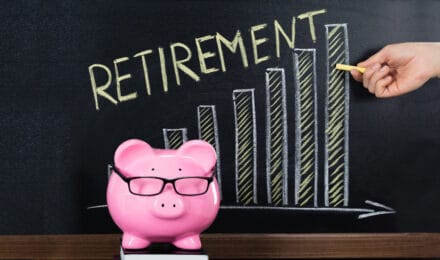With the investment totals of target-date funds soaring, it may be a good time to take a closer look at these unusual investments. As many companies have declared target-rate funds as the default option in their 401Ks, it is no surprise that the assets under management of these vehicles has ballooned in the last ten years. But, are these vehicles a good way to save retirement? Well, yes, is the short answer. Unfortunately that must be followed with a number of caveats.
Let’s start with the solid parts of these funds. Generally speaking, target-date funds, have unsurprisingly, a date at which the fund will manage money toward. So, if you have 20 years until you may retire, there is a fund that will “target” that date. Theoretically, the fund will be more aggressive at the beginning of this 20 year cycle and gradually get more and more conservative as you get closer and closer to retirement. Now, all funds don’t operate this way, as we will see below, but that is the gist of many of them. These funds are basically an all-in-one investment stop. They tend to have all of the main investment vehicles in the one fund. So, large companies, small companies, growth, companies, value companies, long-term bonds, short-term bonds, cash, etc are all included inside of a target-date mutual fund. In addition, they automatically rebalance the portfolio on a regular basis (usually quarterly or yearly), so that the allocation of your funds is always back to the plan. Now, those two items right there is why these vehicles are indeed a good option for many people. After all, we all have heard stories of a 30 year old being all in bonds for fear of the stock market, or others trying to continually try to “time” the markets or even others that have no idea what their funds invest in. So, for a good chunk of people these target-date funds are just what the doctor ordered.
However, there are some significant drawbacks to these funds and they should not be overlooked. For those people nearing retirement you may be surprised to learn that some funds still have 50 or 60 percent of your assets allocated toward stocks. Nothing nefarious is going on, it’s just that their philosophy requires you to be in stocks to protect against inflation. So, they may buy more conservative stocks as the target-date nears and even slowly move your bond portion into cash and other short-term investments. But, make no mistake, as was seen just three years ago, when stocks go down they tend to all go down together. It is important for you to know exactly how much exposure you have in equities, especially if retirement is right around the corner.
For young people, and the word young in the investment world is generous(!), you may be surprised to learn that you have more bonds than you thought. In addition, with rates so low, those bonds may take a huge hit in any downturn as your target-date fund will generally have a lot long-term bonds in it. Maybe more importantly, you may just be too asset “allocated”. The general thrust of these funds is to be average performers, as you end up with nearly every stock in the country. It may behoove you to look around for some more aggressive funds for a portion of your assets. After all, by the very nature of 401K investing, you are dollar cost averaging into the riskier funds. And while it is undoubtedly difficult to root for, mathematically it would be nice if your aggressive funds went down every single month until such time that you begin cutting back as you age. Of course, that would be impossible to maintain as human nature would take over, but you get the idea. For young(ish) investors the very structure of a 401K just screams out to be very aggressive, and target-date funds are really the opposite of that, no matter how far away the date chosen happens to be.
Now, there are other things to look out for, such as fees and track record, but those are a couple of focal points. It basically comes down to knowing what you have. Don’t be so conservative while your young and make sure you are not being more aggressive than you realize when you get closer to retirement. Of course, this depends on one’s individual circumstance as usual, but it’s always a good idea to do a review of one’s portfolio and digging into your 401K target-date fund should not be left out.
With the investment totals of target-date funds soaring, it may be a good time to take a closer look at these unusual investments. As many companies have declared target-rate funds as the default option in their 401Ks, it is no surprise that the assets under management of these vehicles has ballooned in the last ten years. But, are these vehicles a good way to save retirement? Well, yes, is the short answer. Unfortunately that must be followed with a number of caveats.
Let’s start with the solid parts of these funds. Generally speaking, target-date funds, have unsurprisingly, a date at which the fund will manage money toward. So, if you have 20 years until you may retire, there is a fund that will “target” that date. Theoretically, the fund will be more aggressive at the beginning of this 20 year cycle and gradually get more and more conservative as you get closer and closer to retirement. Now, all funds don’t operate this way, as we will see below, but that is the gist of many of them. These funds are basically an all-in-one investment stop. They tend to have all of the main investment vehicles in the one fund. So, large companies, small companies, growth, companies, value companies, long-term bonds, short-term bonds, cash, etc are all included inside of a target-date mutual fund. In addition, they automatically rebalance the portfolio on a regular basis (usually quarterly or yearly), so that the allocation of your funds is always back to the plan. Now, those two items right there is why these vehicles are indeed a good option for many people. After all, we all have heard stories of a 30 year old being all in bonds for fear of the stock market, or others trying to continually try to “time” the markets or even others that have no idea what their funds invest in. So, for a good chunk of people these target-date funds are just what the doctor ordered.
However, there are some significant drawbacks to these funds and they should not be overlooked. For those people nearing retirement you may be surprised to learn that some funds still have 50 or 60 percent of your assets allocated toward stocks. Nothing nefarious is going on, it’s just that their philosophy requires you to be in stocks to protect against inflation. So, they may buy more conservative stocks as the target-date nears and even slowly move your bond portion into cash and other short-term investments. But, make no mistake, as was seen just three years ago, when stocks go down they tend to all go down together. It is important for you to know exactly how much exposure you have in equities, especially if retirement is right around the corner.
For young people, and the word young in the investment world is generous(!), you may be surprised to learn that you have more bonds than you thought. In addition, with rates so low, those bonds may take a huge hit in any downturn as your target-date fund will generally have a lot long-term bonds in it. Maybe more importantly, you may just be too asset “allocated”. The general thrust of these funds is to be average performers, as you end up with nearly every stock in the country. It may behoove you to look around for some more aggressive funds for a portion of your assets. After all, by the very nature of 401K investing, you are dollar cost averaging into the riskier funds. And while it is undoubtedly difficult to root for, mathematically it would be nice if your aggressive funds went down every single month until such time that you begin cutting back as you age. Of course, that would be impossible to maintain as human nature would take over, but you get the idea. For young(ish) investors the very structure of a 401K just screams out to be very aggressive, and target-date funds are really the opposite of that, no matter how far away the date chosen happens to be.
Now, there are other things to look out for, such as fees and track record, but those are a couple of focal points. It basically comes down to knowing what you have. Don’t be so conservative while your young and make sure you are not being more aggressive than you realize when you get closer to retirement. Of course, this depends on one’s individual circumstance as usual, but it’s always a good idea to do a review of one’s portfolio and digging into your 401K target-date fund should not be left out.







